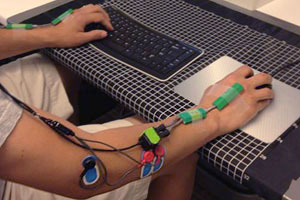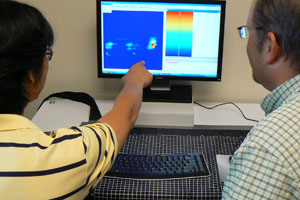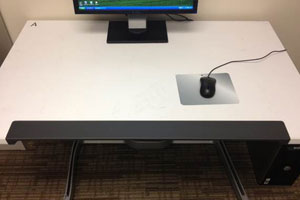New designs could avoid future injury for children as well as adults
Flip over your keyboard and you'll see a warning: "Some experts believe that the use of any keyboard may cause serious injury to hands, wrists, arms, neck and back."
Yes, a keyboard can be hazardous to your health, and even more so a mouse. Musculoskeletal injuries from typing or surfing the Internet can take weeks, months or even years to develop. The aches and pains are easy to ignore, but over time accumulate to the point where they no longer can be ignored. "Once you get injured, it takes longer to heal," says Peter Johnson, associate professor of environmental and occupational health sciences at the UW School of Public Health.

SPH scientists can measure wrist pressure and movement for a variety of computer tasks
Johnson and his colleagues are testing computer devices and desks to see what designs keep workers healthier and more productive. Computer-maker Hewlett-Packard and furniture-maker Steelcase are supporting some of this SPH research, with HP providing $75,000 over the last two years.
Computer manufacturers currently build mice and keyboards with a one-size-fits-all mentality, says Johnson. They're made to accommodate the largest user, much as a door is built for the tallest person. That, says Johnson, puts women and children at greater risk. "If you look at men and women, there's about a 50 percent difference in hand strength," he says, "and also size difference. The keyboard or mouse doesn't discriminate how strong you are." Women basically have to work two to four times harder to operate the mouse and keyboard, he adds.
For children, it's even worse. A five-year-old using a normal 104-key keyboard is like an adult working on keyboard that is three-feet wide, Johnson says. The mouse – which children tend to use more often than a keyboard – is an even greater problem. "Having a kid use an adult mouse is the same as having them wear a size-12 men's shoe when they start to walk," Johnson says. Based on a systematic study of how hand-strength and size changes with age, Johnson recommends four different mouse sizes: one for adult males, one for adult females, one for 10- to-13-year-olds, and one for 5- to-9-year-olds.
The UW researchers are also evaluating how hand-strength and size affects the forces needed to press the mouse button and keyboard. Differences in hand strength are more substantial than differences in hand size, "so it's even more important to get the forces right," Johnson says. Recently, Johnson and Jeong Ho "Jay" Kim, a recent UW PhD grad in industrial engineering, have been testing the new generation of notebooks and tablets. Computer design is pushing the industry towards thinner and sleeker devices, which may substantially alter the "feel" we are used to, but nobody's really evaluated the performance or physical impact of typing on these devices, Johnson says.

Kim and Johnson review test results in the ergonomics lab
A recent study conducted by Kim, Johnson and three other colleagues found that touchscreen keyboards resulted in slower and less accurate typing as well as increased discomfort in the upper extremities and neck and shoulders. "Performance really goes way down when you're using a tablet because you can't touch type," Johnson says. "And you don't have any tactile feedback, so users have to look at the screen." Johnson acknowledges that more people are using tablets, but adds, "We say that they're good for snacking (casual use), but they're not good for a full meal (prolonged work)."
Johnson's advice for tablets: "Enjoy and use in moderation." Or get an external keyboard and try standing, which can reduce bending in the neck. For more traditional computers, women and children should use smaller mice and compact keyboards. Computer makers are not yet designing devices that account for differences in hand strength.
Another issue is the numeric keypad and system navigation keys, which Johnson says take up "substantial real estate" on the right side of the keyboard. "Since we use the mouse two-to-four times more than the keyboard, proper mouse position is paramount and most people would be better off with a compact keyboard," he says. A smaller keyboard brings the mouse into a more neutral position in front of the body, and this reduces the risk for shoulder-related disorders. Only 10 percent of computer users are wedded to the numeric keypad, he estimates. "The problem is the consumer equates value with the number of keys, and may feel cheated without the keypad and system navigation keys."

Steelcase has designed a soft-edge desk meant to reduce stress on the forearms
Desks can cause discomfort, too, so Steelcase, of Grand Rapids, Mich., provided $22,000 to SPH to test a new desk designed to ease pressure on the forearms. Too much contact stress can affect circulation and may ultimately affect the health of tendons and nerves in the forearms, Johnson says.
To evaluate the new desk, the test subjects were asked to perform a series of computer tasks, including typing and using a mouse. Compared to conventional desks, which often have hard square edges, the new Steelcase desk has a soft, thin pliable edge. Subjects used the two desks and did not know which desk had the flexible edge and which one was a normal hard-edged desk. A pad on top of the desks measured contact pressure from the wrists and forearms during the performance of the computer tasks.
The results? "There was a lot less contact stress on the desk with the rubber pad," said Kim, who with Johnson presented the research to Steelcase representatives in August.
The findings are important, Johnson says, because they could lead to the development and marketing of better desks that workers can use with greater comfort. "The desk seems to have met its design goal of distributing the forces over a larger area," he says.
Steelcase Senior Researcher David Trippany said the school's research allowed the company to scientifically investigate the benefits of its new soft edge desk. The company sold its first large order last month. "Steelcase believes that worker comfort is a key aspect in their overall health and productivity while at work," he said.
